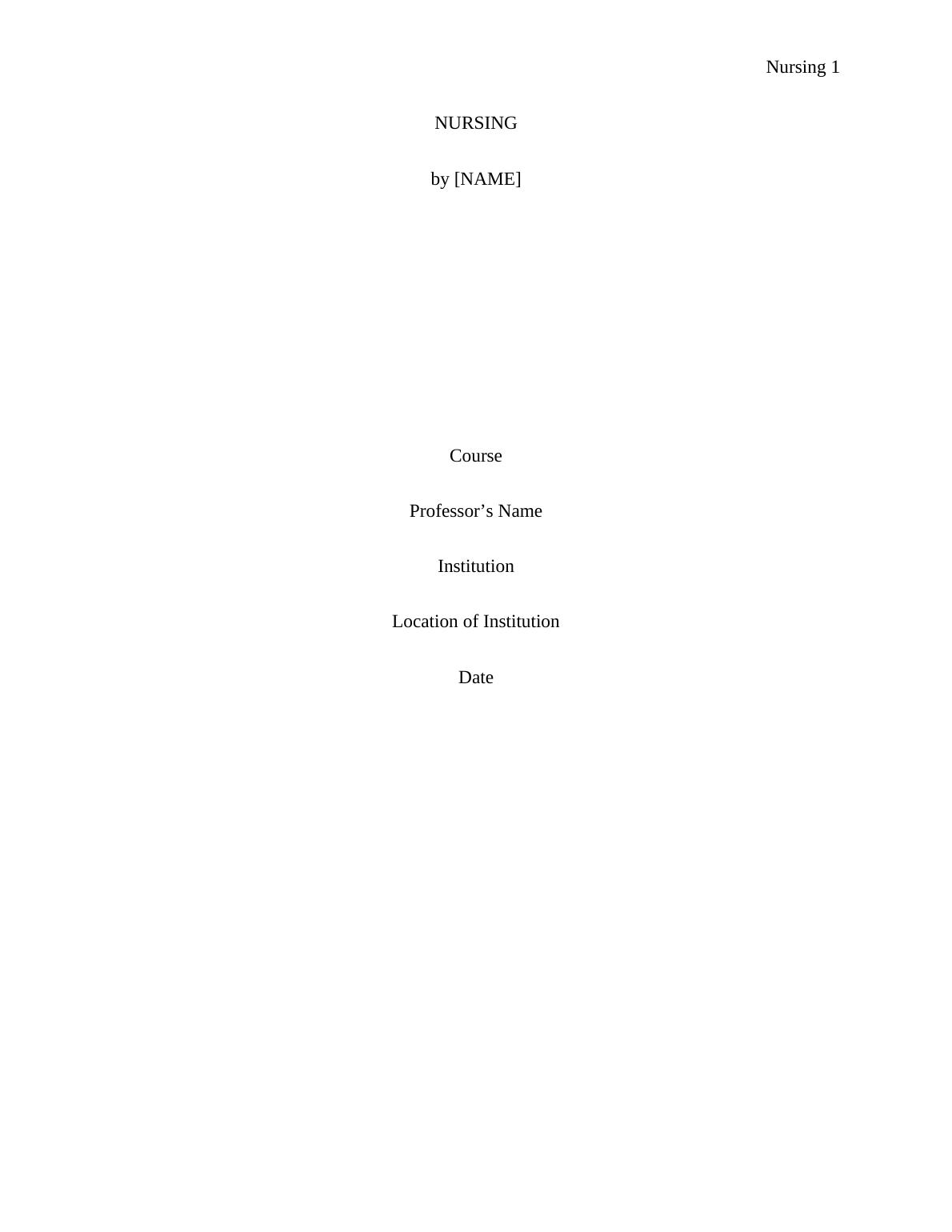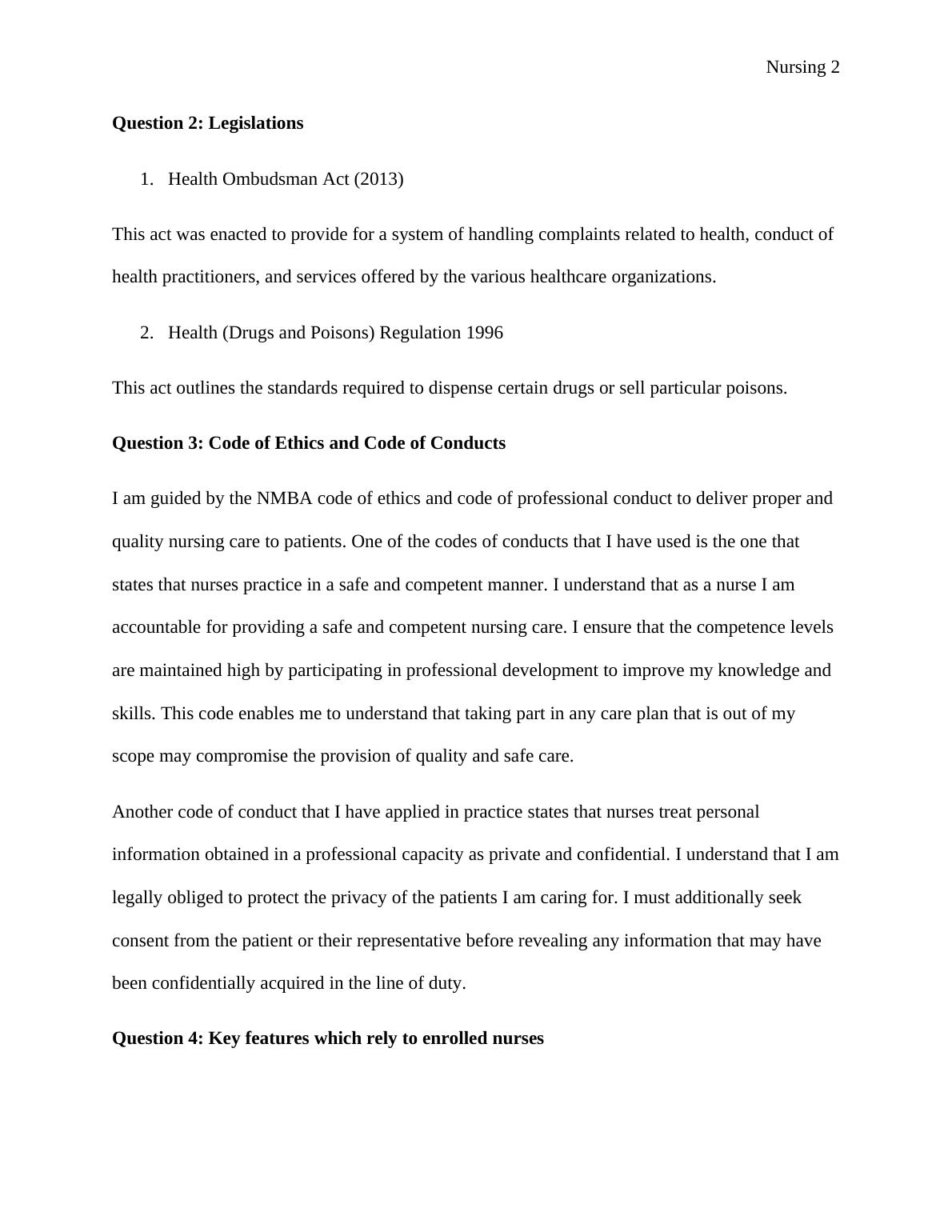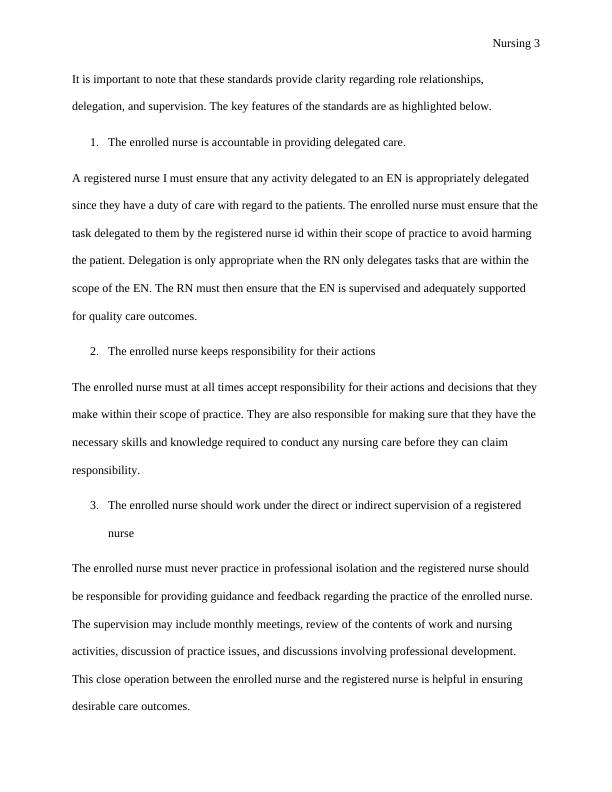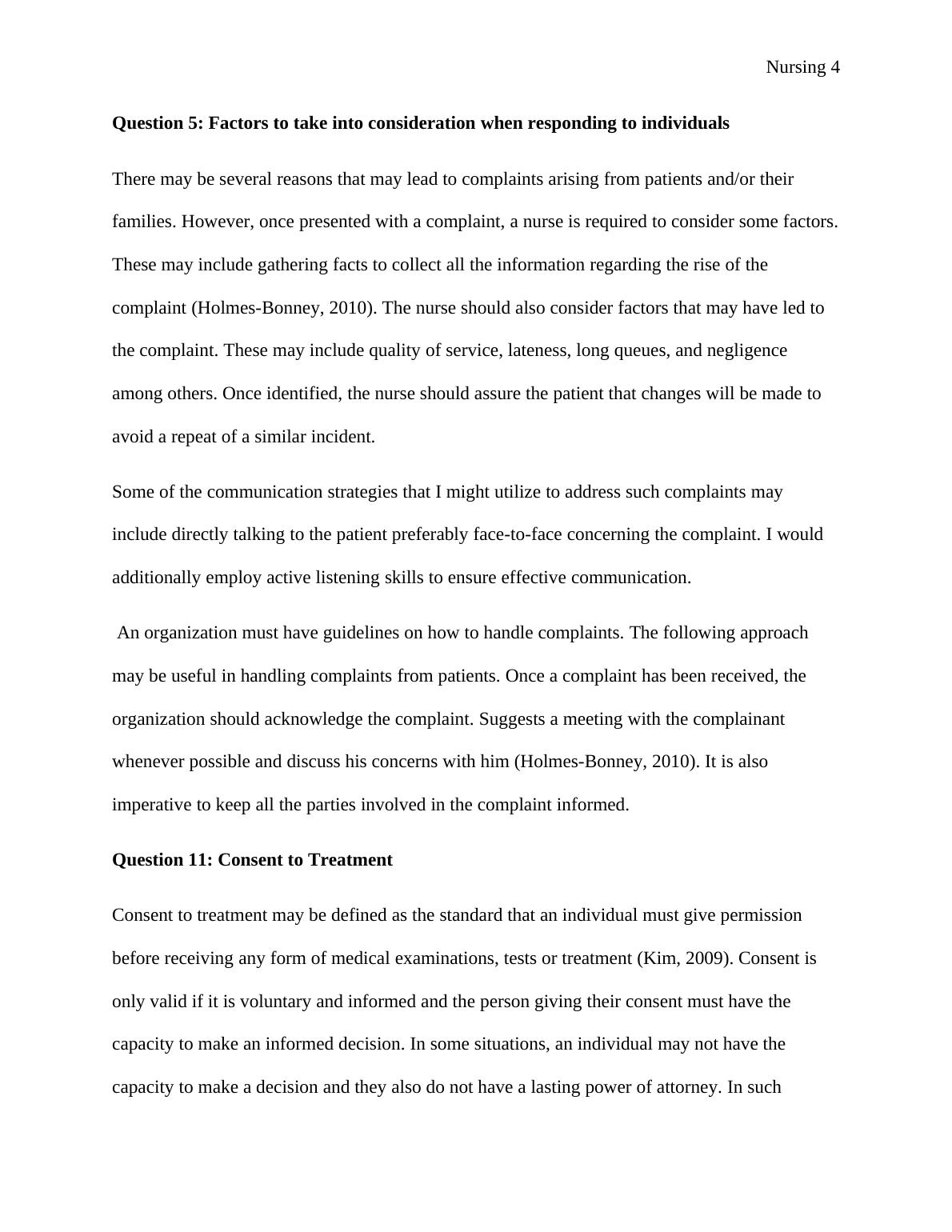Nursing Ethics, Legal Requirements, and Standards: A Comprehensive Guide
Added on 2023-06-05
18 Pages4905 Words78 Views
Nursing 1
NURSING
by [NAME]
Course
Professor’s Name
Institution
Location of Institution
Date
NURSING
by [NAME]
Course
Professor’s Name
Institution
Location of Institution
Date

Nursing 2
Question 2: Legislations
1. Health Ombudsman Act (2013)
This act was enacted to provide for a system of handling complaints related to health, conduct of
health practitioners, and services offered by the various healthcare organizations.
2. Health (Drugs and Poisons) Regulation 1996
This act outlines the standards required to dispense certain drugs or sell particular poisons.
Question 3: Code of Ethics and Code of Conducts
I am guided by the NMBA code of ethics and code of professional conduct to deliver proper and
quality nursing care to patients. One of the codes of conducts that I have used is the one that
states that nurses practice in a safe and competent manner. I understand that as a nurse I am
accountable for providing a safe and competent nursing care. I ensure that the competence levels
are maintained high by participating in professional development to improve my knowledge and
skills. This code enables me to understand that taking part in any care plan that is out of my
scope may compromise the provision of quality and safe care.
Another code of conduct that I have applied in practice states that nurses treat personal
information obtained in a professional capacity as private and confidential. I understand that I am
legally obliged to protect the privacy of the patients I am caring for. I must additionally seek
consent from the patient or their representative before revealing any information that may have
been confidentially acquired in the line of duty.
Question 4: Key features which rely to enrolled nurses
Question 2: Legislations
1. Health Ombudsman Act (2013)
This act was enacted to provide for a system of handling complaints related to health, conduct of
health practitioners, and services offered by the various healthcare organizations.
2. Health (Drugs and Poisons) Regulation 1996
This act outlines the standards required to dispense certain drugs or sell particular poisons.
Question 3: Code of Ethics and Code of Conducts
I am guided by the NMBA code of ethics and code of professional conduct to deliver proper and
quality nursing care to patients. One of the codes of conducts that I have used is the one that
states that nurses practice in a safe and competent manner. I understand that as a nurse I am
accountable for providing a safe and competent nursing care. I ensure that the competence levels
are maintained high by participating in professional development to improve my knowledge and
skills. This code enables me to understand that taking part in any care plan that is out of my
scope may compromise the provision of quality and safe care.
Another code of conduct that I have applied in practice states that nurses treat personal
information obtained in a professional capacity as private and confidential. I understand that I am
legally obliged to protect the privacy of the patients I am caring for. I must additionally seek
consent from the patient or their representative before revealing any information that may have
been confidentially acquired in the line of duty.
Question 4: Key features which rely to enrolled nurses

Nursing 3
It is important to note that these standards provide clarity regarding role relationships,
delegation, and supervision. The key features of the standards are as highlighted below.
1. The enrolled nurse is accountable in providing delegated care.
A registered nurse I must ensure that any activity delegated to an EN is appropriately delegated
since they have a duty of care with regard to the patients. The enrolled nurse must ensure that the
task delegated to them by the registered nurse id within their scope of practice to avoid harming
the patient. Delegation is only appropriate when the RN only delegates tasks that are within the
scope of the EN. The RN must then ensure that the EN is supervised and adequately supported
for quality care outcomes.
2. The enrolled nurse keeps responsibility for their actions
The enrolled nurse must at all times accept responsibility for their actions and decisions that they
make within their scope of practice. They are also responsible for making sure that they have the
necessary skills and knowledge required to conduct any nursing care before they can claim
responsibility.
3. The enrolled nurse should work under the direct or indirect supervision of a registered
nurse
The enrolled nurse must never practice in professional isolation and the registered nurse should
be responsible for providing guidance and feedback regarding the practice of the enrolled nurse.
The supervision may include monthly meetings, review of the contents of work and nursing
activities, discussion of practice issues, and discussions involving professional development.
This close operation between the enrolled nurse and the registered nurse is helpful in ensuring
desirable care outcomes.
It is important to note that these standards provide clarity regarding role relationships,
delegation, and supervision. The key features of the standards are as highlighted below.
1. The enrolled nurse is accountable in providing delegated care.
A registered nurse I must ensure that any activity delegated to an EN is appropriately delegated
since they have a duty of care with regard to the patients. The enrolled nurse must ensure that the
task delegated to them by the registered nurse id within their scope of practice to avoid harming
the patient. Delegation is only appropriate when the RN only delegates tasks that are within the
scope of the EN. The RN must then ensure that the EN is supervised and adequately supported
for quality care outcomes.
2. The enrolled nurse keeps responsibility for their actions
The enrolled nurse must at all times accept responsibility for their actions and decisions that they
make within their scope of practice. They are also responsible for making sure that they have the
necessary skills and knowledge required to conduct any nursing care before they can claim
responsibility.
3. The enrolled nurse should work under the direct or indirect supervision of a registered
nurse
The enrolled nurse must never practice in professional isolation and the registered nurse should
be responsible for providing guidance and feedback regarding the practice of the enrolled nurse.
The supervision may include monthly meetings, review of the contents of work and nursing
activities, discussion of practice issues, and discussions involving professional development.
This close operation between the enrolled nurse and the registered nurse is helpful in ensuring
desirable care outcomes.

Nursing 4
Question 5: Factors to take into consideration when responding to individuals
There may be several reasons that may lead to complaints arising from patients and/or their
families. However, once presented with a complaint, a nurse is required to consider some factors.
These may include gathering facts to collect all the information regarding the rise of the
complaint (Holmes-Bonney, 2010). The nurse should also consider factors that may have led to
the complaint. These may include quality of service, lateness, long queues, and negligence
among others. Once identified, the nurse should assure the patient that changes will be made to
avoid a repeat of a similar incident.
Some of the communication strategies that I might utilize to address such complaints may
include directly talking to the patient preferably face-to-face concerning the complaint. I would
additionally employ active listening skills to ensure effective communication.
An organization must have guidelines on how to handle complaints. The following approach
may be useful in handling complaints from patients. Once a complaint has been received, the
organization should acknowledge the complaint. Suggests a meeting with the complainant
whenever possible and discuss his concerns with him (Holmes-Bonney, 2010). It is also
imperative to keep all the parties involved in the complaint informed.
Question 11: Consent to Treatment
Consent to treatment may be defined as the standard that an individual must give permission
before receiving any form of medical examinations, tests or treatment (Kim, 2009). Consent is
only valid if it is voluntary and informed and the person giving their consent must have the
capacity to make an informed decision. In some situations, an individual may not have the
capacity to make a decision and they also do not have a lasting power of attorney. In such
Question 5: Factors to take into consideration when responding to individuals
There may be several reasons that may lead to complaints arising from patients and/or their
families. However, once presented with a complaint, a nurse is required to consider some factors.
These may include gathering facts to collect all the information regarding the rise of the
complaint (Holmes-Bonney, 2010). The nurse should also consider factors that may have led to
the complaint. These may include quality of service, lateness, long queues, and negligence
among others. Once identified, the nurse should assure the patient that changes will be made to
avoid a repeat of a similar incident.
Some of the communication strategies that I might utilize to address such complaints may
include directly talking to the patient preferably face-to-face concerning the complaint. I would
additionally employ active listening skills to ensure effective communication.
An organization must have guidelines on how to handle complaints. The following approach
may be useful in handling complaints from patients. Once a complaint has been received, the
organization should acknowledge the complaint. Suggests a meeting with the complainant
whenever possible and discuss his concerns with him (Holmes-Bonney, 2010). It is also
imperative to keep all the parties involved in the complaint informed.
Question 11: Consent to Treatment
Consent to treatment may be defined as the standard that an individual must give permission
before receiving any form of medical examinations, tests or treatment (Kim, 2009). Consent is
only valid if it is voluntary and informed and the person giving their consent must have the
capacity to make an informed decision. In some situations, an individual may not have the
capacity to make a decision and they also do not have a lasting power of attorney. In such

End of preview
Want to access all the pages? Upload your documents or become a member.
Related Documents
Health professional Assignmentlg...
|8
|1875
|38
Registered Nurses | Nursing Standardslg...
|6
|1360
|21
Legal and Professional issues in nursinglg...
|18
|3961
|495
Essay on Importance of Nurseslg...
|5
|1159
|58
HNN 217 - Nursing Practice Assignment Onlg...
|12
|3140
|45
Reflect on and Improve own Professional Practicelg...
|13
|2021
|255
